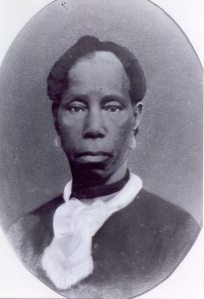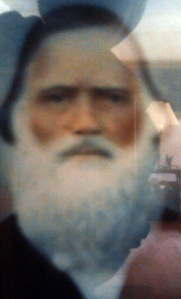Welcome to the Tyson Family Roots Blog
Lou Patsy was born about 1817 in Virginia
This picture tells a story, her eyes show it all. She had been through a lot, you can see it. I have her picture framed in my home and people always comment on her eyes and they are amazed that I have a photo of a slave ancestor. Lou Patsy and all of her children were among the few free persons of color in Caddo Parish. In 1840 there were 27 free persons of color in Caddo, in 1850 there were 39, and by 1860 Caddo had 69 free persons of color of which 14 lived on John Frederick Herndon’s plantation. We know nothing on Lou Patsy’s family at all. Our family lore says she was part Blackfoot but I’ve yet to confirm any Native American ancestry for her. My only family clue for Lou Patsy is the death certificate of her son Joseph that listed her maiden name as Charles. Lou Patsy was a slave owned by John Frederick Herndon, a large land and slave owner from Fredericksburg, Virginia. JF Herndon brought Lou Patsy to Caddo Parish in the late 1830’s and was one of the early settlers of Caddo Parish. It’s still unknown how JF Herndon came to own Lou Patsy. In 1840 JF Herndon emancipated Lou Patsy in the Caddo Parish court along with 2 of her children that she had by him. At 23 years old Lou Patsy and her children were now free. JF Herndon never married and lived with Lou Patsy and his children by her. They had 10 known children; Mary Ann, Sarah Jane, Joseph Henry, John Jr., Jacob, James B, Edward, Martha, Katie, and my great grandmother Fannie born in 1857. Lou Patsy also had another daughter Isabella with an unknown father. Here are transcriptions of the two known court appearances on the Emancipation of Lou Patsy, one from 1840 the other from 1845. 1840 (on file at the Caddo Clerk and Shreveport Broadmoor Library) Caddo Parish Police Jury Minutes – 10/12/1840 A petition was laid before the Board of Police by Washington Jenkins Parish Judge of the Parish of Caddo at the request of John F. Herndon for the Emancipation of his Slave Patsy. The petition passed its first reading but was laid over until the next meeting for the purpose of obtaining more information. Caddo Parish Police Jury Minutes – 12/8/1840 The Court of Police after receiving the foregoing reports took into consideration and discussed the petition of John F. Herndon for the Emancipation of his colored woman, Patsy, which passed its first reading at the preceding Term of the Court and after due examination passed its second reading and is as follows: To his Honour the Parish Judge of the Parish of Caddo, Your petitioner a citizen of Caddo Parish respectfully represents to your Honour that he is the owner of a Colored woman named Patsy who from long and faithfull Services rendered your Petitioner both when he labored under Sickness and been in health, he is anxious and conscientiously believes it to be his duty to set at liberty together with her offspring your Honour will do me the favour to lay this petition before the Police Jury at its next meeting and a subsequent [illegible] and do and perform such other acts and things as may be necessary for the ultimate relief of your and he will ever pray be, Signed, John F. Herndon On motion it was resolved that the aforegoing petition be received and adopted and that the Slave Patsy and her offspring be emancipated for life. 1845 (Cad C 377 1806) – 29 Apr 1845 Herndon, John F to EMANCIPATION. Patsy Herndon, f, 28 and her 5 children, Mary Ann Herndon, Sarah Jane Herndon, Joseph Herndon, Jacob Herndon and John Herndon. *binds himself to take care of women and her 5 children. Wit. J B and Parsons, James W. Judge: Jenkins, Washington – pg69 No Land Only Slaves – Vol 3/Caddo Parish, on file at Caddo Clerk The first court appearance doesn’t name her two children but it is known that they were Mary Ann and Sarah Jane. The 1845 court appearance does name the five children she had. I have plans to get copies of all the original documents to see any additional information that may be there. Lou Patsy is listed in the 1850, 1860, 1870, & 1880 Caddo census with the same consistent information provided, born in Virginia around 1817. She is named in the Will of JF Herndon from 1880 so we know she was alive then. By 1900 she had died, it’s too bad the 1890 census was destroyed as it may have showed her listed again. She had a granddaughter named Lou Patsy Herndon that was born in 1894 so it’s possible that she died around that time and the granddaughter was named after her. Some of this family did very well with farming and timber on their land in Pine Island. In 1904 when oil was discovered in Pine Island it turned the whole scene around. Fortunes were made for some overnight. Many were also swindled by lease hounds and lost their land. Many were also ripped off via “slant drilling”. Someone could setup a well across your border and slant drill into your land and steal your oil. This happened to many in the area, and it happened to my grandfather. All and all Lou Patsy’s children did very well, namely her sons Joe and James and a few grandsons. Story of Joseph Herndon and Herndon Magnet School in Belcher –http://caddotrees.com/Herndon_School_history.html Story of Lou Patsy’s grandson David Herndon Raines here – http://caddotrees.com/Raines_story.html. Lou Patsy is said to be buried next to JF Herndon at the Herndon/Raines Family cemetery known as Rang Cemetery in Pine Island. I’ve heard that her original headstone had a dove on it. Something must have happened to it because I’ve looked around there a few times and can’t find her grave. That’s the story of The Emancipation of Lou Patsy and her children Thanks for reading Blessings

